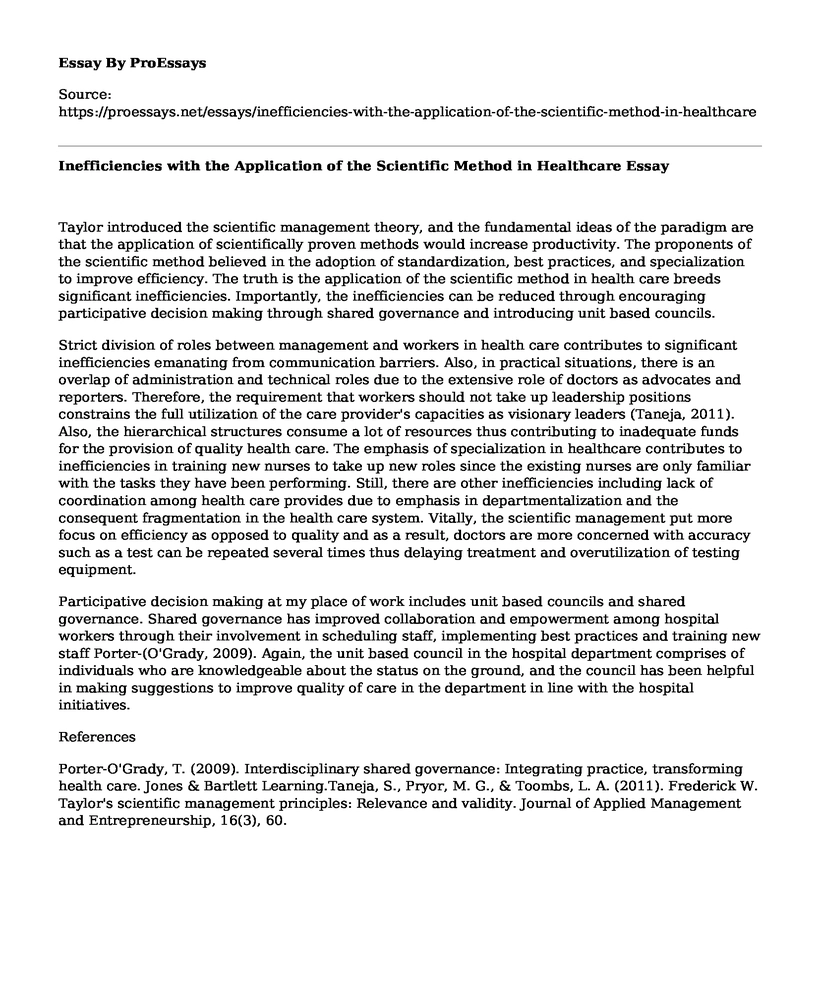Taylor introduced the scientific management theory, and the fundamental ideas of the paradigm are that the application of scientifically proven methods would increase productivity. The proponents of the scientific method believed in the adoption of standardization, best practices, and specialization to improve efficiency. The truth is the application of the scientific method in health care breeds significant inefficiencies. Importantly, the inefficiencies can be reduced through encouraging participative decision making through shared governance and introducing unit based councils.
Strict division of roles between management and workers in health care contributes to significant inefficiencies emanating from communication barriers. Also, in practical situations, there is an overlap of administration and technical roles due to the extensive role of doctors as advocates and reporters. Therefore, the requirement that workers should not take up leadership positions constrains the full utilization of the care provider's capacities as visionary leaders (Taneja, 2011). Also, the hierarchical structures consume a lot of resources thus contributing to inadequate funds for the provision of quality health care. The emphasis of specialization in healthcare contributes to inefficiencies in training new nurses to take up new roles since the existing nurses are only familiar with the tasks they have been performing. Still, there are other inefficiencies including lack of coordination among health care provides due to emphasis in departmentalization and the consequent fragmentation in the health care system. Vitally, the scientific management put more focus on efficiency as opposed to quality and as a result, doctors are more concerned with accuracy such as a test can be repeated several times thus delaying treatment and overutilization of testing equipment.
Participative decision making at my place of work includes unit based councils and shared governance. Shared governance has improved collaboration and empowerment among hospital workers through their involvement in scheduling staff, implementing best practices and training new staff Porter-(O'Grady, 2009). Again, the unit based council in the hospital department comprises of individuals who are knowledgeable about the status on the ground, and the council has been helpful in making suggestions to improve quality of care in the department in line with the hospital initiatives.
References
Porter-O'Grady, T. (2009). Interdisciplinary shared governance: Integrating practice, transforming health care. Jones & Bartlett Learning.Taneja, S., Pryor, M. G., & Toombs, L. A. (2011). Frederick W. Taylor's scientific management principles: Relevance and validity. Journal of Applied Management and Entrepreneurship, 16(3), 60.
Cite this page
Inefficiencies with the Application of the Scientific Method in Healthcare. (2022, Nov 20). Retrieved from https://proessays.net/essays/inefficiencies-with-the-application-of-the-scientific-method-in-healthcare
If you are the original author of this essay and no longer wish to have it published on the ProEssays website, please click below to request its removal:
- A Case Study of Zimbabwe's Gross Domestic Product
- ADHD Symptoms and Treatment Paper Example
- How Marketers Compel Customers to Buy Products? - Essay Sample
- Optimal Currency Areas: Understanding Exchange Rates & Output Fluctuations - Essay Sample
- Essay Example on Dad Suing School Board After Daughter's Suicide on School Trip
- Essay Example on Mexican American: My Cultural Identity Journey in Shaping My Personality
- The Right Age for Drinking or Smoking Onset - Essay Sample







